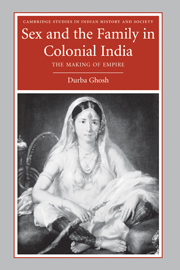Book contents
- Frontmatter
- Contents
- Paintings credits
- Acknowledgments
- Introduction
- 1 Colonial companions
- 2 Residing with begums: William Palmer, James Achilles Kirkpatrick and their “wives”
- 3 Good patriarchs, uncommon families
- 4 Native women, native lives
- 5 Household order and colonial justice
- 6 Servicing military families: family labor, pensions, and orphans
- Conclusion
- Bibliography
- Index
- Miscelloneous Endmatter
5 - Household order and colonial justice
Published online by Cambridge University Press: 05 August 2014
- Frontmatter
- Contents
- Paintings credits
- Acknowledgments
- Introduction
- 1 Colonial companions
- 2 Residing with begums: William Palmer, James Achilles Kirkpatrick and their “wives”
- 3 Good patriarchs, uncommon families
- 4 Native women, native lives
- 5 Household order and colonial justice
- 6 Servicing military families: family labor, pensions, and orphans
- Conclusion
- Bibliography
- Index
- Miscelloneous Endmatter
Summary
While native women expressed their cultural, religious, and racial affiliations in their own writings in various ways, early law courts in Bengal made native women into legal subjects in particular ways, especially when they appeared in courts as defendants, witnesses, and plaintiffs. While the courts' understanding of the legal status of native women seemed to undercut any agency these subjects had in fashioning their legal selves, the cases in this chapter show how active and seemingly knowledgeable litigants, defendants, plaintiffs, and their lawyers were in creating narratives and subjectivities that might result in favorable decisions. This dialogic process, however asymmetrical in its results, shows how marginal figures in colonial communities — native women, children, slaves, and servants — were drawn into the institutional apparatus of the British courts as participants, becoming subjects of the court's jurisdiction. By becoming engaged in colonial judicial processes, native subjects, inadvertently and unintentionally, solidified the colonial judiciary's claims to political authority and its ability to construct a normative gendered and racial order within interracial households.
Through two sets of legal disputes, civil and criminal, this chapter explores how various judicial institutions of the East India Company state managed the diverse populations over which it ruled. The first dispute was a civil suit about inheritance in a family with a Muslim mother and a Christian son. The second set of disputes involved domestic violence crimes committed in and around the households of European men that included native women.
- Type
- Chapter
- Information
- Sex and the Family in Colonial IndiaThe Making of Empire, pp. 170 - 205Publisher: Cambridge University PressPrint publication year: 2006



